It’s a big week next week. Are you ready?
As the end of the year very rapidly approaches, this coming week represents the last real work week of the year for many of us.
With Christmas and New Years coming on Wednesdays in the next few weeks, it means a major slowdown at most workplaces. It also means that this week is your last and best chance to get anything done that requires collaboration, or another company or decision maker to move.
Let’s make the most of that week, and give you some great things to think about over the break:
Table of contents:
- 🥘 Food for Thought on Do You Need an Alter Ego?
- 📰 News & Reports for Managers on new Pew Research on the Workplace
- 🗳️ Share Your Opinion withthe Lighthouse Leadership Weekly Survey
- 📖 Your Leadership Long Read on the Key to Improving Your Performance Appraisal Process
- ❓ Poll of the Week on 1 on 1s and Career Growth
➡️ Did a friend forward this to you? Get every issue straight to your inbox by signing up here.
Note: This is a preview of our weekly leadership newsletter, Lighthouse Leadership Weekly (LLW).
To get this sent to your inbox every week, along with our latest long form essays on this blog, you can sign up here.

🥘 Food for Thought - Do you need an Alter Ego?
When I say, “Alter Ego”, what do you think?
- Clark Kent and Superman?
- Walter White and Heisenberg?
- Hannah Montana and Miley Stewart?
Regardless of your favorite pop culture reference, alter egos are fun.
They represent becoming something totally different and embracing powers you would otherwise not have.
Alter Egos aren’t just for TV, Movies, and Cartoons.
What if I told you an alter ego can help you conquer a major weakness you have? What if it could calm your nerves and help you perform with the abilities you know you have deep down?
Turns out, it’s true.
You can.
Construct an Alter Ego for yourself.
I recently read the book, the Alter Ego Effect, and I was pleasantly surprised by the impact.
While it may sound hokey to make an alter ego for yourself. It works.
How do I know? I made one for myself and saw the results.
In a situation that would often lead to disappointment and underperforming, suddenly I found myself calm, centered, focused, and precise. The results were impossible to miss.
(I know that’s a bit vague, but one of the things the book says is you shouldn’t share your exact Alter Ego, because he finds it weakens the power of it.)
Now that I’ve read the book, and seen how it goes in practice, I can see what it’s really doing. He’s basically created a framework that allows you to trick your mind into:
- Embodying traits you admire in the form of a character you’ve chosen
- Calling it into action with a simple ritual at the time of your performance
- Reinforcing it when needed in the middle of the action.
It combines to help get you out of a bad mindset (choking, struggling, blanking, getting nervous, etc) and into a great one.
And for managers, rather than telling you simply to pick up the book, I’m going to share some examples of leadership-specific challenges that an Alter Ego could help you with:
- Public speaking: Do you struggle in front of a crowd? Wish you had the charisma of Tony Robbins? An alter ego can help you.
- Giving great feedback despite discomfort: Do you struggle to tell people bad news and tough feedback? Wish you could serve it up with the confidence of Gordon Ramsey (but with maybe a bit more care)? An alter ego can help.
- Confidence negotiating: Do you struggle to get your worth and make counter-offers? Wish you could negotiate with the strength of Don Corleone? An alter ego can help.
- Handling tough feedback: Is it hard for you to receive critical feedback? Do you wish you could be as un-phased as Miranda Priestly? An alter ego can help.
- Enjoying the people side of your job: Do you have a hard time getting amped up and making the most of networking, building rapport and the glad-handing side of leadership? Wish you had the extroversion and friendliness of Ted Lasso, or the bold confidence of Samantha Jones?
The point with all of this is that, if there’s a part of your skillset as a leader you feel is just totally lacking compared to what you need, especially if you in theory know what you need to do, then an Alter Ego could be perfect for you.
So the question for you to reflect on this week is: What area of your life do you wish you could show up in a different, more powerful, or confident way?
If you don’t already have an answer to how you’ll improve that area, then take a look at the Alter Ego Effect to help you.
📚 News and Reports for Managers
Pew has a new study out of 5,273 employed U.S. adult workers they surveyed in October of 2024.
Their findings help bring scale and shape to things you may have been feeling but weren’t sure if they’re widespread, which is why we’re reviewing a few of their findings here.
1) The age old, “I’m not paid enough for this…” continues to ring true for many.
One of the key measures in the study were how people felt about their compensation.
As it turns out, 29% of workers were “not too or not at all satisfied with their pay”.
Given that’s nearly 1 in 3 workers, it’s something to pay attention to, and fortunately, Pew has secondary data breaking down the reasons for this:
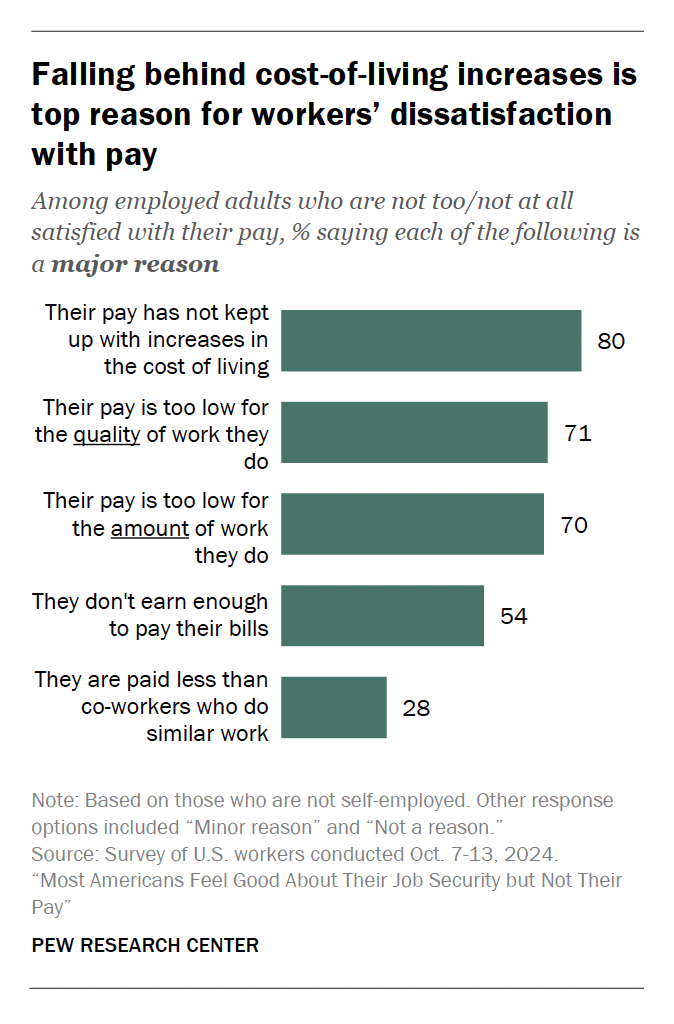
As you can see, the top 3 reasons, which all were found in more than 7 in 10 respondents who were unhappy with their pay, have very strong attitudes.
How would you work if you felt underpaid, overworked, and disrespected compared to the quality of your work?
The fact is, even if you disagreed with your team member that felt this way, you have to realize the toxic impact of this attitude:
- They’re going to stop giving their best, because they don’t think it’s worth it.
- They will not do much work beyond the bare minimum.
- They’re likely to complain to coworkers, spreading discontent.
- They’ll frustrate their coworkers, who may start seeing them slacking, or as a bottleneck.
Have some compassion, too.
Remember: just because the economy hasn’t had much inflation lately doesn’t mean people aren’t hurting now.
Prices have been stable for awhile, but they’re stable at the new high; if you’re in a more comfortable salary band for your monthly expenses, you may have forgotten this. If groceries have been up 50% for the last 2 years, then that’s 2 years of struggling for some people.
2) The fear of layoffs seems to have subsided, finally.
Most workers (69%) feel that they have a great deal or a fair amount of job security.
Yet, despite this confidence in their existing job, they’re not confident they could find another:
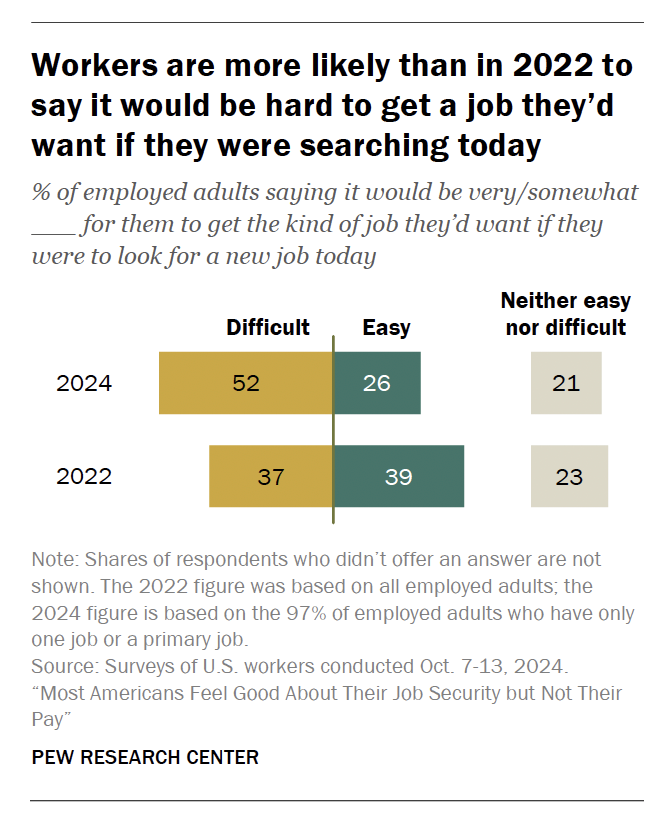
So while the economy isn’t so weak that people are afraid they’ll lose their job, they don’t see a lot of opportunity out there yet either.
I also think this is attributable to the number of people who have been long term unemployed; we all likely know at least one person who has struggled to find their next job. It’s then easy for that to influence your own attitudes about a job hunt.
3) The top reasons for people not getting training are within a manager’s control
Are your team members growing? Are they building new skills?
According to Pew, many workers aren’t learning new skills right now as 49% have not received any training in the past 12 months.
And the reasons why are things you can control:
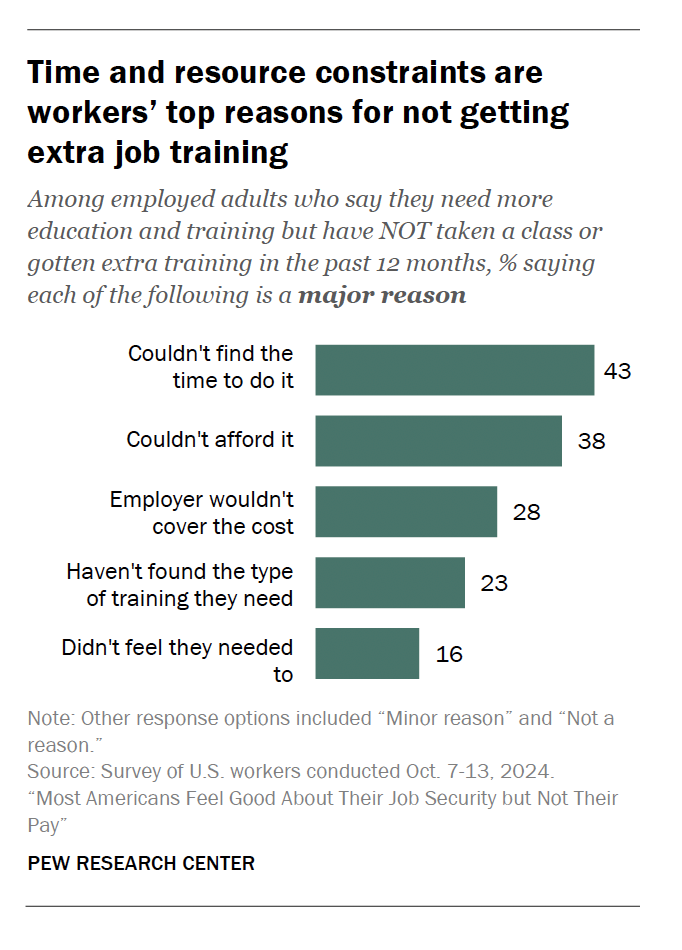
Let’s run down these from your perspective:
- “Couldn’t find the time to do it”: Managers can make this a priority and make sure their teams have the time, or choose training methods and options that fit your team’s schedule.
- “Couldn’t afford it” and “Employer wouldn’t cover the cost”: As a manager, you choose what to advocate for and at least attempt to get budget for. Good training pays you back many times.
- “Haven’t found the type of training they need”: It shouldn’t only be on your team to find training. A good coach is proactive in finding the training their team needs (if you can’t provide it yourself).
You can see all the data and takeaways, including interesting insights about whether people see their job as a career or just a job here:
🗳️ Share Your Opinion
As we approach issue 100 of this newsletter, and year 11 of Lighthouse, I’m thinking a lot about the future and what makes sense for readers like you.
I’d really appreciate your feedback in this quick, 3 question survey.
Your answers will directly influence the future of Lighthouse in 2025, and you’ll also be entered to win a free leadership book of your choosing.
You can take the survey and enter to win here.
📖 Your Leadership Long Read on the key to improving your performance appraisal process
Is it performance review time for you again? Are you dreading it, or kind of looking forward to it?
How does your team feel about them?
Whether you love or hate them, or have a lot of mixed feelings, there is more that you could be doing to make them a good use of everyone’s time.
In this week’s post we take a look at how you can make this whole process a lot more valuable, and easier, for everyone involved.
See for yourself in: The Surprising Key to Improving Your Performance Appraisal Process.
❓ Poll of the Week
Last week, we asked you about your beliefs on the frequency of 1 on 1s leaders should have with their teams.
I’m pleased to see that many of you, as the saying goes, “understood the assignment”:
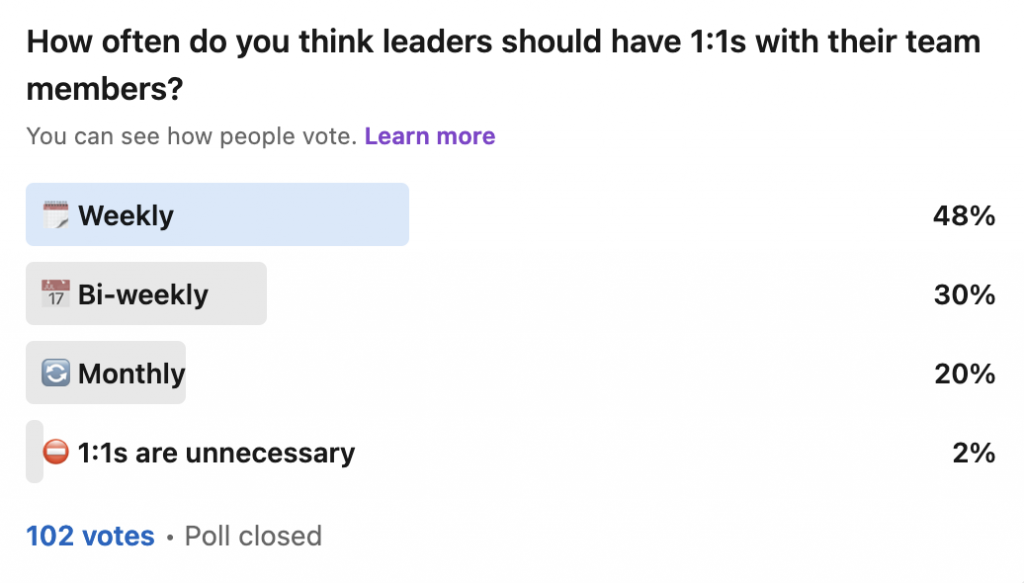
Weekly or bi-weekly 1 on 1s are the best approach
A lot can happen in a week. And even more happens in a month. That’s why checking in every week or two with your team members is so crucial.
You ask them to bring their best 40+ hours a week. You can give them 30-60 minutes every 80+ of those hours, can’t you?
If you’re not sure, here’s more for the 22% of you that have 1 on 1s monthly or less.
And you can see more nuance added to the discussion in the comments to the poll here.
—
Now, this week, we ask you about another key habit: Talking about you team’s career:
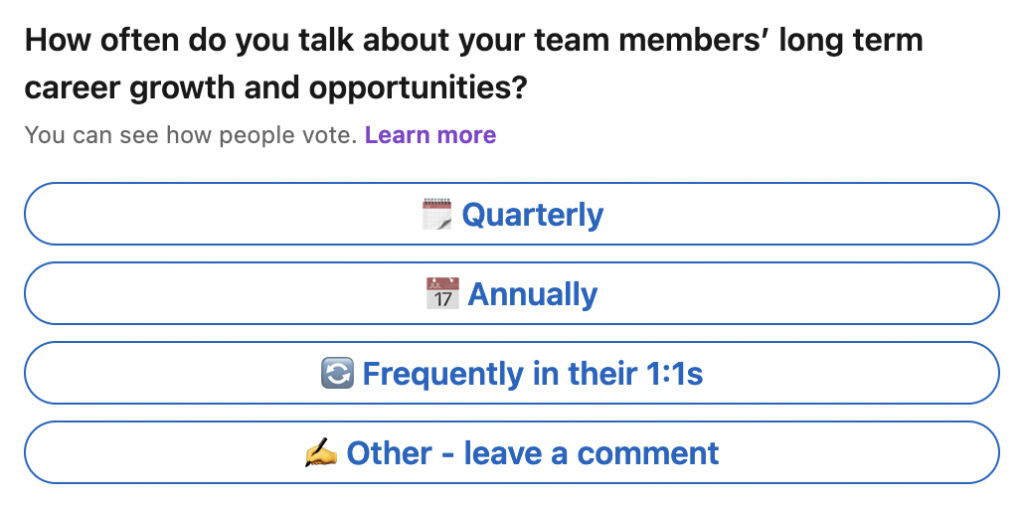
Sign up to get this newsletter & our latest blog posts straight to your inbox:




